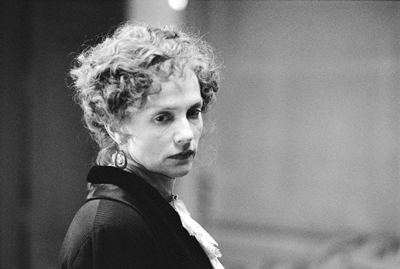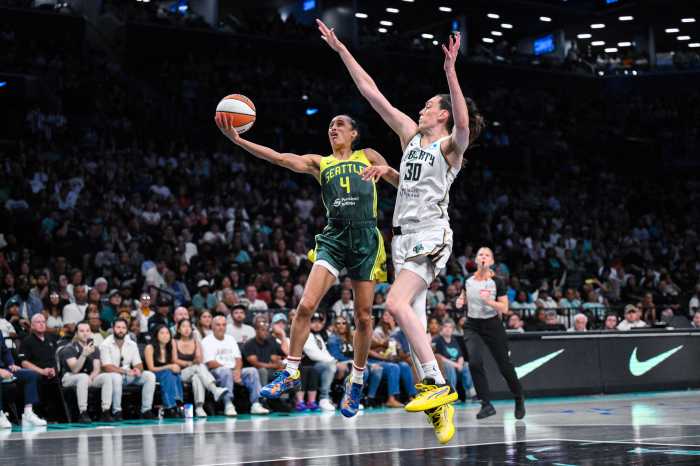Passionless relations in “Gabrielle”
French critic and director Luc Moullet once said that “morality is a matter of tracking shots,” an idea soon lifted by Jean-Luc Godard. If one accepts that film style implies an ethical perspective on the world—or lack thereof—is sexuality, too, a matter of tracking shots? Do camera movements have a gender? These questions are implicit in Patrice Chéreau’s “Gabrielle.”
The director begins in a very aggressive style. Cinematographer Eric Gauthier’s camera swoops and swoons in glorious Cinemascope, lord of all that it surveys. It seems to represent the perspective of Jean (Pascal Greggory), the film’s wealthy and arrogant protagonist. The film stock switches back and forth between black and white and color, seemingly at random. If the changes embody anyone’s point of view, it’s Jean’s; as he gazes upon his wife Gabrielle (Isabelle Huppert) from a distance, he’s in color, but she’s in black and white. Jean has mastery of language, speaking a great deal but also delivering a voice-over and interjecting his thoughts in intertitles. There’s a great deal of emotional turbulence implicit in the film’s form, but for the first reel, it works on the level of implication and subtext. When Jean and Gabrielle’s marriage collapses, it switches to a far more sedate style. A long sequence where Gabrielle talks alone to her servant is shot and edited without the elaborate camera movements—or narration and intertitles—of the scenes where Jean held sway.
Adapted from Joseph Conrad’s short story “The Return,” the plot of “Gabrielle” is extremely simple. It takes place over 36 hours, begining with Jean’s walk home from the train. While doing so, he delivers a voice-over about his success and feelings of security. His social life is based around elaborate dinner parties, made possible by a stable of servants. His complacency crumbles when he reads a letter from Gabrielle. She tells him that she has left him for another man. However, her departure doesn’t last long. As Conrad’s title suggests, she comes back to Jean, but the couple must reinvent their relationship in order for it to have any chance of succeeding. Given that they can barely stand each other’s company, that’s a tall order.
Chéreau has long been interested in the way relationships can sustain themselves without love. His 2001 film “Intimacy,” also co-written by him and Anne-Louise Tridivic, investigated one based solely on anonymous sex, examining the way it grew beyond that limited basis. “Gabrielle” explores a marriage without even the promise of physical pleasure. The most positive thing either Jean or Gabrielle ever says about their marriage is “I don’t regret living with you.” Politicians who claim that marriage has existed for thousands of years as an unchanging institution never seem to mention that the notion that it should be based around love is a relatively recent one.
“Gabrielle” is set at the point where this idea began to take root but makes it clear that it was an ideal not always lived up to. Isabelle Huppert brings the baggage of a series of roles as repressed women who explode in destructive ways, as in Claude Chabrol’s “La Ceremonie” and Michael Haneke’s “The Piano Teacher.” While Gabrielle recalls other Huppert characters, she also differs greatly from them. Conrad’s short story privileged Jean, rendering Gabrielle an enigma with only a handful of lines. Chéreau’s film restores a gender balance to the narrative. Gabrielle’s largely satisfied with a life of low expectations and few rewards or risks. She’s come to accept that love will be absent from her life and has learned to make peace with it. As for sex, Jean and Gabrielle’s halfhearted fumbling would be comic in a less grim context. One gets the sense that when they talk to each other, both are really talking to themselves.
It would be easy to put a facile feminist interpretation on “Gabrielle,” seeing the title character as a victim of her times. To some extent, she is, but Huppert never asks the audience’s sympathy or plays her as an object deserving pity. Few of us would want to live her life, but she’s passive enough to accept that marriage can go on for years without any real emotional commitment. She doesn’t exactly liberate herself or get revenge on a bad husband through adultery; the man she chooses to have an affair with is no improvement on Jean. He is the partner who winds up really hurt by their marriage’s passionless nature.
In the wrong hands, literary period pieces can be the most stultifying form of cinema; for much of the ‘90s, they seemed to dominate American art houses. Despite its source and setting, “Gabrielle” has more in common with Ingmar Bergman than Merchant-Ivory. Paradoxically but excitingly, it brings a rare degree of immediacy to a story that reminds us that the past is a foreign country.
gaycitynews.com


































